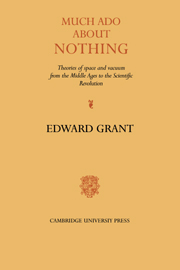 Much Ado about Nothing
Much Ado about Nothing Preface
Published online by Cambridge University Press: 07 October 2011
Summary
As the place within which bodies could move and rest and the potential frame of the universe, empty space was a central theme in physical thought from Greek antiquity to the Scientific Revolution. Despite a great awakening interest in the history of science in this century, only a few significant studies have appeared to shape our understanding of earlier spatial conceptions. However much these works may differ from each other, they share one common feature: Medieval and early modern scholastic contributions are excluded from serious consideration, and in most cases mentioned not at all. Given the almost universally held assumption that Aristotelian scholastics had nothing to contribute, their omission caused no comment. Serious discussions on space were thought to have begun in the Renaissance with the likes of Nicholas of Cusa or Bernardino Telesio.
The historical realities, however, are quite otherwise. Scholastics did indeed play a significant role in the development of a concept of infinite space that would be acceptable to the majority of nonscholastics for whom the relationship between God and space was still a vital matter. Demonstration of this claim is a major objective of my study, which is divided in two major parts (the third being a conclusion). The first concerns the existence of intracosmic void, which was always conceived as if it were surrounded by the innermost surface of one or more material bodies.
- Type
- Chapter
- Information
- Much Ado about NothingTheories of Space and Vacuum from the Middle Ages to the Scientific Revolution, pp. xi - xivPublisher: Cambridge University PressPrint publication year: 1981


